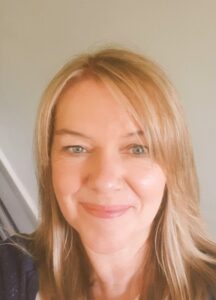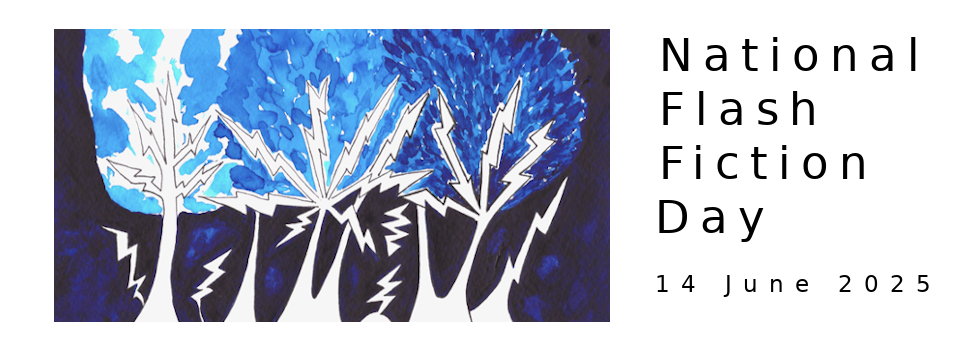Welcome to the first in our series of interviews with this year's National Flash Fiction Day Anthology editors and Microfiction Competition judges! Submissions for the Anthology and Microfiction Competition are open from 1 December 2021 to 15 February 2022.
This week, Diane Simmons chats with Karen Jones, one of this year's editors for the 2022 NFFD Anthology, about reading in public, humour, her novella-in-flash, as well as what she is (and isn't) looking for when reading anthology submissions....

Diane: Firstly, thank you for agreeing to be a co-editor of this year’s anthology. The theme is FREEDOM. Is there anything you would like to particularly see in submissions? Or not see?
Karen: Thank you for the invite – I’m delighted to be part of NFFD. I’d love to see some wild interpretations of the theme – things I hadn’t thought of, things that make me sit up and take notice. I always say when I’m judging or acting as submissions editor that I want you to surprise me, and it’s no different here. Themes can be constricting but I hope this one can be interpreted widely enough to allow people do something different. Or, you know, if you’re telling an old story, at least tell it in a new way.
I don’t particularly want to see a lot of pandemic stories, purely because I’ve seen so many already, and I’m also not a big fan of twist endings. Other subjects it’s probably best to avoid, again, because we see them so often, are dementia/Alzheimer’s, cancer, death of a child. I’m not saying don’t write about any of these things, just be aware that you may be up against lots of others writing on the same themes, and that immediately reduces your chances of being accepted.
Diane: I always enjoy hearing you perform your stories. Do you have any advice for writers who are perhaps daunted by the prospect of reading out a flash for the first time?
Karen: There’s a standing joke amongst people who first heard me try to perform that I sent earthquake tremors through Partick in Glasgow. I trembled so much that the paper I read from shook, my legs wobbled, my voice quivered. The next time I was due to read I contacted a friend who was a seasoned performer – she even read one of her poems at the opening of the Scottish Parliament – and she told me to read something already published and to say to myself, ‘This is good. It’s objectively good. It’s not something only your pals or family liked – it’s published, it’s worthy. And if the audience don’t get that, sod them.’ While the last part made me laugh, it turned out be excellent advice. Now I absolutely love performing, love the applause, love the validation. I’ve gone from trembling wreck to needing someone to wrestle the microphone out of my hand so someone else can get a turn. Believe in yourself and your words is the takeaway from this. At a more basic level, practise, practise, practise. And read much more slowly than feels natural. And remember – everyone listening/watching wants you to do well. Everyone in that audience is on your side. They want you to succeed, and they will help you do that by cheering for you at the end. And breathe. Remember to breathe.
Diane: Your novella-in-flash When it’s Not Called Making Love was published by Ad Hoc Fiction in 2020. I have head you mention that it draws very much from your own life. Is this something you do much of in the rest of your writing?
Karen: A lot of my stories and flashes and short stories, do, to some extent, draw on my life and experiences. When you write things that have happened to you or people you know, there’s an authenticity to the voice and character that helps the reader connect emotionally to the story. The best stories and characters draw the reader in, make them believe, make them feel. So, yes, I do draw very much from my own life and my own country.
Diane: You use a lot of humour in your flash fictions. Humour can be difficult to pull off. Do you have any tips?
Karen: Funny is hard. It’s probably one of the most difficult genres because, more than any other, it is so subjective. Think of how often you and a friend have disagreed over what is a funny film or sitcom or book. Restraint is probably the keyword where it comes to writing comedy. It can be so tempting to rush in, trying too hard, filling stories with endless funny situations, constant one-liners, all characters having hilarious names, puns by the pound… and that’s where it falls flat. Trying too hard is the worst thing you can do with humour. A gentle touch is, for me, better. Humour tucked into a dark story, or all out humour but with subtlety. Not easy, but so worthwhile when it’s done well. I’ve heard people say that if you laugh at one of your own jokes, you should cut it. I disagree. If you make yourself laugh, cherish it, nourish it – that’s where the gold lies.
Diane: Do you need silence or an empty house to write or would you rather be in a crowded café or a room full of people?
Karen: I don’t think I’d enjoy writing in a room full of people or busy café, though I’ve never really tried. However, I used to get the bus into Glasgow and then walk two miles down to Kelvingrove Art Galleries and sit in in the gallery that exhibits the Scottish Colourists, put classical music on my iPod and write for a couple of hours. That was probably my most productive writing period. On the bus and on the walk, I’d listen to passing conversations and make mental notes of things I could use. At the galleries, I’d people watch, always finding new characters. There was so much material right there. In the past few years, that hasn’t been possible, but I do still love to block the world out by plugging into some Mozart and just writing rambling nonsense until something starts to feel like it might be a story. I have a bit more time now, so may well start my bus journeys and walks to the galleries again. If you see me on the bus, whisper so I don’t steal your words.
*I know very little about art or classical music – I think that may have helped, because I wasn’t distracted by it, I just enjoyed being immersed in it. *
Karen Jones is a flash and short story writer from Glasgow, Scotland. Her flashes have been nominated for Best of the Net, Best Micro Fiction and The Pushcart Prize, and her story Small Mercies was included in Best Small Fictions 2019 and BIFFY50 2019. In 2021 she won first prize in the Cambridge Flash Fiction Prize, Flash 500, Reflex Fiction and Retreat West Monthly Micro and was shortlisted for To Hull and Back, Bath Flash Fiction, Bath Short Story Award and longlisted for Fractured Lit Flash Fiction Prize. Her work has been published in numerous anthologies and magazines. Her novella-in-flash, When It’s Not Called Making Love is published by Ad Hoc Fiction. She is Special Features Editor at New Flash Fiction Review.

Pingback: I’d love to see some wild interpretations of the theme: Revisiting Karen Jones – National Flash Fiction Day